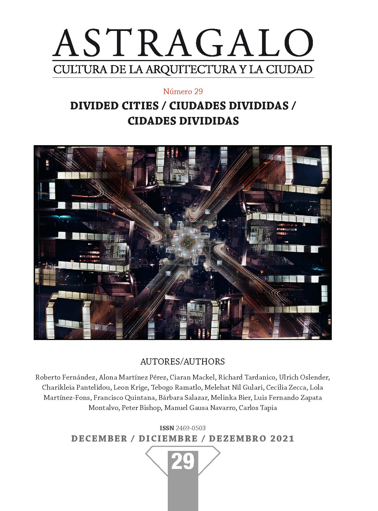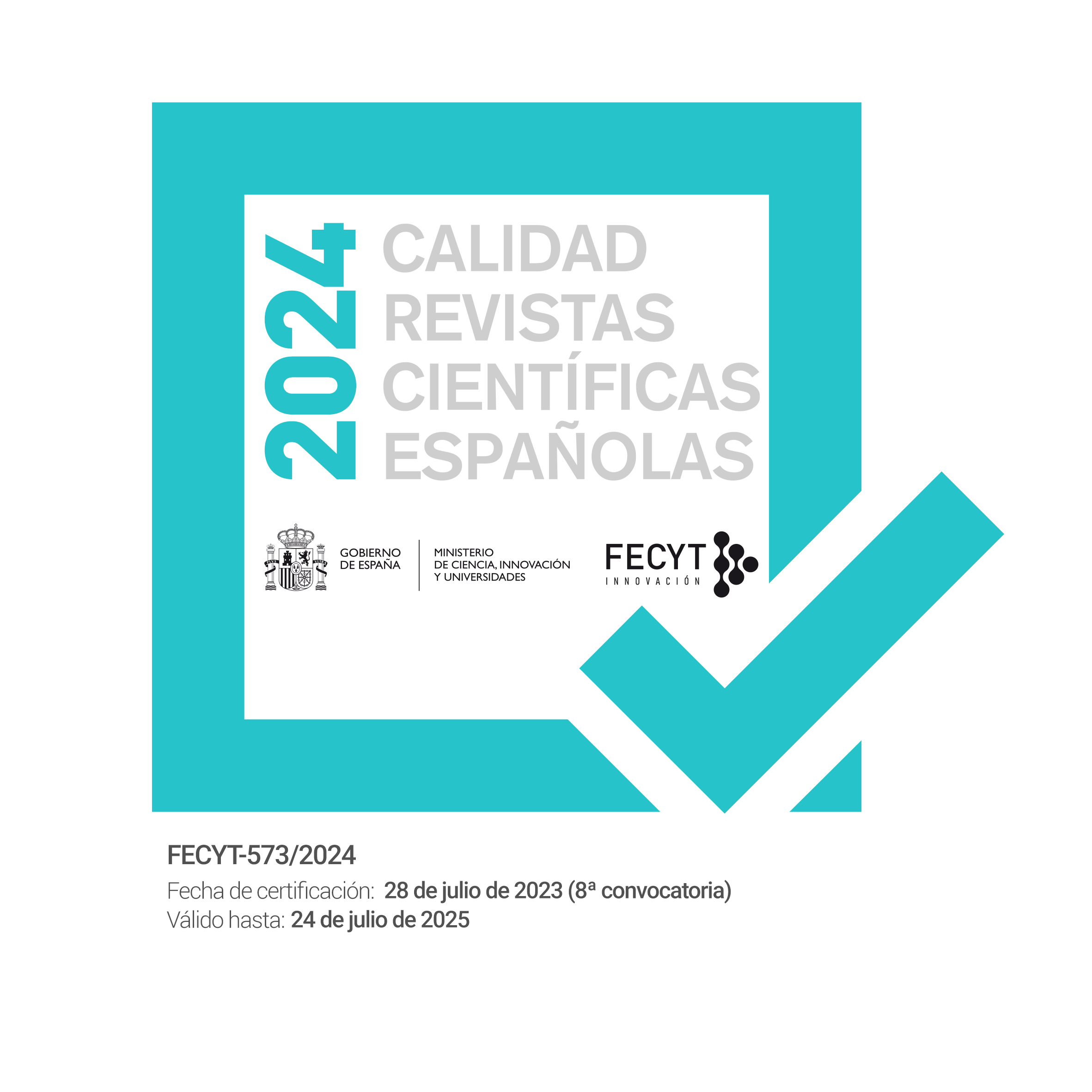Spaces of exclusivity and exclusion
From the house to the neighborhood and from the city to the islet
DOI:
https://doi.org/10.12795/astragalo.2021.i29.06Keywords:
housing, interiority, boundaries, gated communities, othernessAbstract
In the last decades we witness an urban transformation which is characterized by exclusivity. Gated neighbourhoods are being constructed all over the world in an attempt of the middle and upper-middle classes to protect themselves against the other, in this way perpetuating methods of spatial injustice. What is distinct though at the case of gated neighbourhoods is the fact that the exclusion of the ‘other’ is combined with the (self-)restriction of the ‘normal’, while at the same time the concepts of interior and exterior, in reference to spatiality, are being reinterpreted and redefined. In this context the contemporary city appears in new forms that deviate from the Modern spatial normality and the usual correspondences of spatial and social structures. The following questions are explored here: What are the spatial and social qualities of the gated neighbourhoods? And, how has the socio-spatial phenomenon of gated neighbourhoods transformed the contemporary urban space? Based on theory and content analysis of a novel, this paper aims to investigate the ways that the urban landscape is being reversed through the contemporary urban reality of the socio-spatial exclusions.
Downloads
References
Boyle, Thomas Coraghessan. 1996. The Tortilla Curtain. Toronto: Penguin.
Bakhtin, Mikhail. 1984 [1968]. Rabelais and his World, trans. by H. Iswolsky. Bloomington: Indiana University Press.
Bauman, Zygmunt. 1997. Postmodernity and its discontents. New York: New York University Press.
Blakely, Edward y Snyder, Mary Gail. 1997. “Divided We Fall. Gated Communities in the United States”. Architecture of Fear, editado por Nan Ellin and Edward Blakely. New York, NY: Princeton Architectural Press: 85-99.
Butler, Judith. 1997. The Psychic Life of Power: Theories in Subjection. Redwood City CA: Stanford University Press.
Debord, Guy. 2002 [1970]. Society of the Spectacle. St Petersburg FL: Black and Red.
Dripps, Robert Dunning. 1997. The first house: Myth, paradigm, and the task of architecture. London and Cambridge, MA: MIT Press.
Foucault, Michel. 1982. “The Subject and Power”. Critical Inquiry, 8, 4: 777-795.
Foucault, Michel. 1991. “Governmentality.” The Foucault Effect: Studies in Governmentality, editado por Graham Burchell, Colin Gordon y Peter Miller. Chicago: University of Chicago Press: 87-104.
Grant, Jill y Mittelsteadt, Lindsey. 2004. “Types of gated communities”. Environment and Planning B: Planning and Design. 31, 6: 913-30.
Harvey, David. 1992. "Social justice, Postmodernism and the City." International Journal of Urban and Regional Research, 16, 4: 588–601.
Kondylis, Panagiotis. 1991. Der Niedergang der burgerlichen Denk- und Lebensform. Die liberale Moderne und die massendemokratische Postmoderne. Weinheim: Acta Humaniora.
Lefas, Pavlos. 2009. Dwelling and Architecture: From Heidegger to Koolhaas. Berlin: JOVIS.
Le Goix, Ronald. 2006. “Gated Communities as Predators of Public Resources: The Outcomes of Fading Boundaries between Private Management and Public Authorities in Southern California”. Private Cities. Global and Local Perspectives, editado por Georg Glasze, Chris Webster and Klaus Frantz. London; New York: Routledge: 76-91.
Low, Setha. 2004. Behind the Gates: Life, Security, and the Pursuit of Happiness in Fortress America. London, Routledge.
Marcuse, Peter. 1995. “Not Chaos, but Walls: Postmodernism and the Partitioned City”. Postmodern Cities and Spaces, editado por Sofia Watson and Kathie Gibson. Oxford: Blackwell: 243-53.
McKenzie, Evan. 2006. “The Dynamics of Privatopia: Private Residential Governance in the USA”. Private Cities. Global and Local Perspectives, editado por Georg Glasze, Chris Webster and Klaus Frantz. London; New York: Routledge: 9-30.
Pantelidou, Charikleia. 2019. Gated Communities and Spatial-Social Exclusion: Form and Meaning Transformations in the Contemporary Urban Space. Athens: Nissos (in Greek).
Pantelidou, Charikleia. 2020. “The Spatial Ethos of the Carnivalesque: Urban Space as ‘the-private-within-the public“. The City and Complexity: Life, Design and Commerce in the Built Environment, Proceedings of the AMPS -Architecture, Media, Politics and Society- 2020 International Conference. University of London. Vol. 2: 180-187.
Paraskevopoulos, Nikos. 2008. “The extension of criminal law: real and symbolic dimensions”. Honorary Volume for Anna Benaki-Psarouda: Criminal Sciences, Theory and Praxis. Athens: Sakkoula: 485-496 (in Greek).
Petropoulou Chryssanthi. 2020. “Ciudades invisibles y cambio de habitus: narrativas cartográficas, poéticas y rebeldes. Ejemplos de Ciudad Bolívar (Bogotá) y Comuna 13 – San Javier (Medellín)”. Narrativas, Geografias, Cartografias - para viver, é preciso espaço e tempo, editado por Nelson Rego y Salete Kozel, en colaboración con Ana Francisca de Azevedo. Universidade do Minho, UFPR, UFRGS. Porto Alegre: Editora Compasso Lugar Cultura e Editora IGEO, Vol. 2: 669-723.
Rifkin, Jeremy. 2001. The Age of Access. New York: TarcherPerigee.
Sassen, Saskia. 2010. “Foreword: Urban Gating - One Instance of a Larger Development?” Gated Communities: Social Sustainability in Contemporary and Historical Gated Developments, editado por Samer Bagaeen and Ola Uduku. London: Routledge.
Simon Jonathan, Temple Nicolas y Tobe Renée. 2013. Architecture and Justice: Judicial Meanings in the Public Realm. Surrey: Ashgate.
Tsoukala, Kyriaki. 2010. “Introduction: Postmodern aspects”. Postmodern aspects, editado por Kyriaki Tsoukala, Maria Daniil and Charikleia Pantelidou. Thessaloniki Epikendro: 15-50 (in Greek).
Webster, Chris. 2002. “Property Rights and THE Public Realm: Gates, Green Belts, and Gemeinschaft”. Environment and Planning B: Planning and Design, 29: 397-412.
Wilson-Doenges, Georjeanna. 2000. “An exploration of sense of community and fear of crime in gated communities”. Environment and Behavior 32, 5: 597-611.
Žižek, Slavoi. 1989. The Sublime Object of Ideology. Brooklyn, NY: Verso.
Žižek, Slavoi. 2001. Did Somebody Say Totalitarianism? Brooklyn, NY: Verso.
Downloads
Published
Versions
- 2022-02-07 (4)
- 2022-02-04 (3)
- 2022-02-04 (2)
- 2022-02-04 (1)
How to Cite
Issue
Section
License
Copyright (c) 2021 CHARIKLEIA PANTELIDOU

This work is licensed under a Creative Commons Attribution-NonCommercial-ShareAlike 4.0 International License.












 2024 QUALIS-CAPES: Anthropology / Archaeology A3; Architecture, Urban Planning And Design A3; Urban And Regional Planning / Demography A3
2024 QUALIS-CAPES: Anthropology / Archaeology A3; Architecture, Urban Planning And Design A3; Urban And Regional Planning / Demography A3





